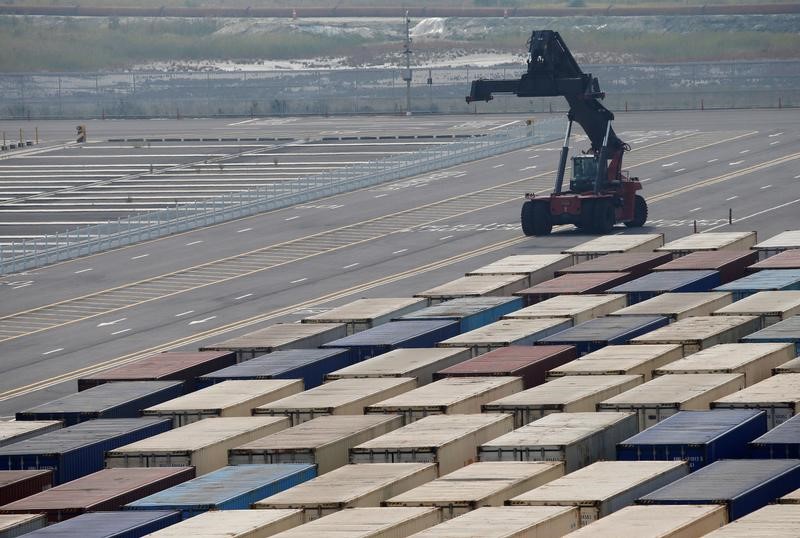
Shipping containers are seen at the Hanjin Shipping container terminal at Incheon New Port in Incheon, South Korea, September 7, 2016. REUTERS/Kim Hong-Ji
November 1, 2017
By Cynthia Kim
SEOUL (Reuters) – Soaring memory chip sales helped South Korea exports record 12 consecutive months of growth in October, evidence Asia’s fourth largest economy is stepping up a gear.
While shipments growth moderated from September, October outpaced September in terms of average exports per working day, highlighting brisk business activity.
“October exports showed export fundamentals are still strong. Given that there was waning of the low-base effect, and only 18 working days, October fared well,” said Stephen Lee, an economist at Meritz Securities.
Exports grew 7.1 percent on-year, far below bumper growth of 35 percent in September, but average exports per working day came in at $2.5 billion, outperforming September’s $2.35 billion, government data showed on Wednesday.
South Korea celebrated the annual Chuseok holiday from Oct. 2 through Oct. 9, shortening the number of working days from 23.5 in September to 18.
Asia’s fourth-largest economy has been riding an unexpectedly robust export cycle on strong global demand for memory chips, which has cushioned some softness in private consumption.
Exports to China jumped 13.5 percent from a year ago, posting double-digit growth for a third month in a row, as demand for intermediate goods including memory chips and petrochemical products remained strong.
Shipments to the United States dropped 12 percent, as exports of cars and machines slowed, government data showed.
Imports expanded 7.4 percent on-year, below analysts’ forecasts of 11.5 percent and also moderating from 22.6 percent growth in September.
A separate government report showed inflation moderated in September to the slowest pace in 10 months, muting calls for an interest rate hike in coming months.
The consumer price index rose 1.8 percent in October from a year ago, below the 1.9 percent projected in a Reuters survey, and falling short of the Bank of Korea’s (BOK) 2 percent target.
Such subdued inflation may raise new doubts about the central bank’s next steps given that market participants have been expecting the bank to raise interest rates for the first time in over six years at its Nov. 30 meeting.
“Inflationary pressure is not strong, and it now seems there is no urgent need for a rate increase,” said Lee Sang-jae, an economist at Eugene Investment & Securities.
Lee said he still sees a hike at the bank’s November meeting, but acknowledged the BOK could act later than expected as slower inflation triggered new doubts about growth momentum in the economy.
In a Reuters poll conducted on Oct 27, 11 of 13 economists said they saw the BOK raising its policy rate by 25 basis points from a record low of 1.25 percent at the end-November meeting. All those who forecast a hike in November cited much stronger-than-expected third-quarter growth readings posted on Oct. 26.
Wednesday’s data showed prices were down 0.2 percent on a monthly basis versus the survey’s expected 0.1 percent decline.
October’s core inflation, which strips out volatile food and fuel prices, was an annual 1.3 percent, down from September’s annual 1.6 percent.
Fresh food costs moderated after surging through the summer, increasing 1.8 percent on-year following a 6 percent jump in September. Prices of electricity, gas and water decreased 1.6 percent following an 8 percent increase in September.
(Reporting by Cynthia Kim; Additional reporting by Dahee Kim; Editing by Eric Meijer)

